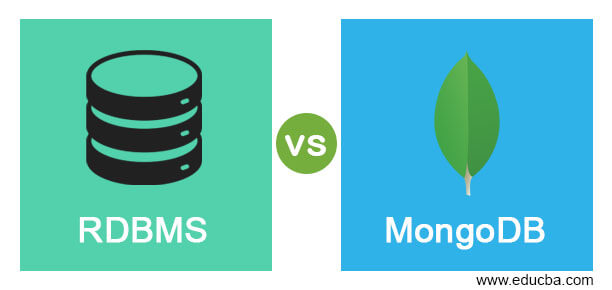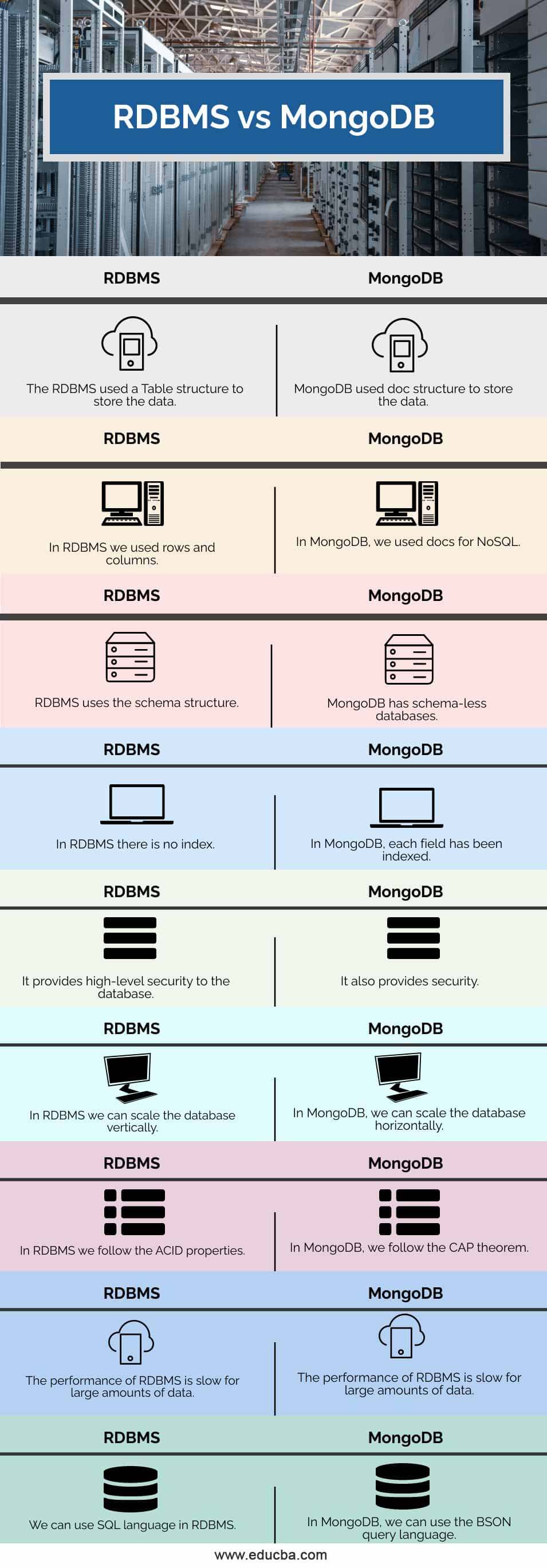Updated June 2, 2023
Difference Between RDBMS vs MongoDB
Basically, RDBMS stands for relational database management system; it is used to store the data based on the relational model. Normally with RDBMS, we can create a database, we can update the database as well as delete the database as per user requirement. In another word, we can say that we can interact differently with the different databases as per user requirements. On the other hand, MongoDB is also used to store the data and it is an open-source document-oriented database. It is also called a NoSQL database. NoSQL means we can store data in documents format without rows and columns. In this topic, we are going to learn about RDBMS vs MongoDB.
Key Differences
First, try to understand RDBMS.
The relational database management system (RDBMS)is a typical kind of data set that stores information in tables, so it very well may be utilized corresponding to other put away datasets. Most data sets utilized by organizations these days are social information bases, rather than a level record or progressive data set. Most of the current IT systems and applications depend on a social DBMS.
Relational data sets have the muscle to deal with huge numbers of information and complex inquiries. Numerous tables are standard utilization for current information bases. The information is frequently put away in numerous tables, likewise called ‘relations’. These tables are partitioned into lines, likewise called records and sections (fields). There can be a great many columns in a data set. Sections consist of one explicit information type, similar to city or cost.
Now let’s see the important factors of RDBMS as follows.
Starting Setup: This is the very initial stage of selecting RDBMS. The setting of DBMS, enhancing it for ideal tasks, and future-sealing it for development requires sufficient adaptability for incorporation into the momentum information foundation. Synchronization with different stages is likewise fundamental for a continuous work process.
Security of Data: Each and every type of database provides different types of security methods such as encryption; access rights as well as we can protect the stored data. Data security is an important key factor when we select any database and most of the time we can consider authorization and authentication of users.
Data Model: RDBMS provides the different types of models to the user that means sometimes we need to work on the unstructured data then we can use RDBMS that means RDBMS provides the hybrid model for that. Finally, we can say as per user requirements we can use a data model.
Data reliability and accuracy: RDBMS supports the or we can say that RDBMS works as per the ACID properties, that means RDBMS provides the data consistency, reliability of data, atomicity of data, etc.
In RDBMS we can use the create table command to create the table as follows.
create table table_name (colm name 1 data type(size), colm name 2 data type(size), colm name N data type(size));
Now let’s see what MongoDB is and why it has more advantages over the RDBMS as follows.
MongoDB is an exceptionally mainstream open-source Document Database that works as a NoSQL data set. It is famously utilized in a joint effort with AWS, Azure, and numerous different information hotspots for application advancement and working.
Now let’s see what the key features of MongoDB are over the RDBMS as follows.
Object Model: Basically MongoDB supports the object model and we can use nested means for multiple levels as per our requirement. Object models are present everywhere and we can use them in any structure as well as we can provide the indexing to the object at any level as per user requirement.
Optional Indexes: Indexes accelerate the inquiries fundamentally yet they likewise delay down composes. Optional files are a five-star development in MongoDB. This makes it simple to file any property of an article put away in MongoDB regardless of whether it is settled. This makes it truly simple to question from the information base dependent on these auxiliary lists.
Replication and high accessibility: MongoDB upholds a “solitary expert” model. This implies you have an expert hub and various slave hubs. On the off chance that the expert goes down, one of the slaves is chosen as an expert. This cycle happens naturally however it typically requires some investment, before the 3.2 delivery, 10-40 seconds were taken yet after the arrival of MongoDB 3.2, and later, disappointments are recognized quicker and another pioneer chose in less than 2-10 seconds.
Local Aggregation: MongoDB has an inherent Aggregation system to run an ETL (Extract, change, and burden) pipeline to change the information put away in the data set. This is incredible for little to medium positions however as your information handling needs become more muddled the conglomeration structure becomes hard to troubleshoot.
Pattern or schema-less Models: MongoDB, permits you to not uphold any diagram on your reports. While this was the default in earlier forms, in the fresher adaptation you have the choice to authorize a blueprint for your records. Each record in MongoDB can have an alternate design and it is dependent upon your application to decipher the information. While this isn’t pertinent to most applications, now and again the additional adaptability is significant. Building fewer models imply that reports in a similar assortment don’t have to have a similar arrangement of fields or design, and normal fields in an assortment’s archives might hold various kinds of information.
In MongoDB we use a collection instead of the table, so we can create a collection by using the following statement as follows.
db.createCollection(“specified collection name”)
Comparison table
Now let’s see the comparison table between RDBMS and MongoDB as follows.
| RDBMS | MongoDB |
| The RDBMS used a Table structure to store the data. | MongoDB used doc structure to store the data. |
| In RDBMS we used rows and columns. | In MongoDB, we used docs for NoSQL. |
| RDBMS uses the schema structure. | MongoDB has schema-less databases. |
| In RDBMS there is no index. | In MongoDB, each field has been indexed. |
| It provides high-level security to the database. | It also provides security. |
| In RDBMS we can scale the database vertically. | In MongoDB, we can scale the database horizontally. |
| In RDBMS we follow the ACID properties. | In MongoDB, we follow the CAP theorem. |
| The performance of RDBMS is slow for large amounts of data. | The performance of MongoDB is fast for a large amount of data. |
| We can use SQL language in RDBMS | In MongoDB, we can use the BSON query language. |
Conclusion – RDBMS vs MongoDB
We hope from this article you learn more about RDBMS vs MongoDB. From the above article, we have learned the basic concept of RDBMS and MongoDB. and we also see the different key factors of RDBMS and MongoDB. From this article, we learned how and when we use the RDBMS and MongoDB.
Recommended Articles
This is a guide to RDBMS vs MongoDB. Here we discuss the RDBMS vs MongoDB key differences with infographics and a comparison table. You may also have a look at the following articles to learn more –




